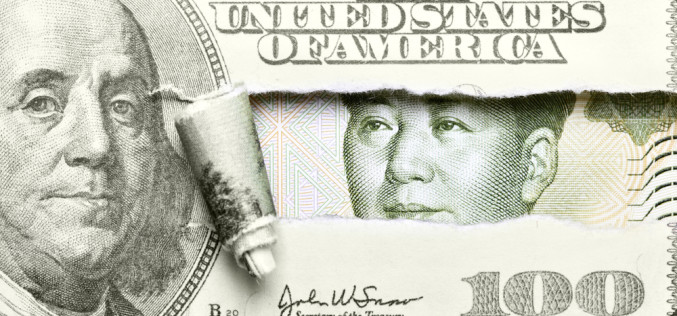Battle Of The Reserve Currencies: Dollar Vs. ...Yuan?
I was sitting around the other day trying to decide what to do with all of my worthless dollars. I’m constantly bombarded with messages telling me how the buck will buckle, leaving my Franklins and Jacksons worthless. Guess I’ve got to do something with this worthless heap of cotton fiber.
Let’s see… should I build a bonfire, sending the notes up in smoke, or unceremoniously bag them up as trash? Better yet, I could relive my elementary school days in the 1970s and create one of those cool-at-the-moment-but-awful-in-retrospect decoupage art pieces. Now that’s an option!
Or how about this… instead of taking all the greenback haters at their word, I could take a peek at the real world, where the dollar has gained ground against the yen and the euro over the last couple of years. From this perspective, my choice to hold on to my dollars looks pretty smart.
But now there’s yet another challenge to U.S. dollar hegemony — the Chinese yuan.
Recently the Chinese started the Asian Infrastructure Investment Bank (AIIB), a competitor to the U.S.-led World Bank.

They aren’t going it alone. The Chinese have signed up 40-odd other countries to join it as founding members. The list of participants includes long-term U.S. allies like the United Kingdom and Germany. Clearly this is the beginning of the end of the U.S. dollar. Or is it?
China’s main reason for starting the bank, according to them, is to rebalance the voting power of a development bank that lends in Asia to better represent Asian countries.
The World Bank lends to many emerging Asian nations, who then fund the bank through loan repayments. But most of the voting power remains in Western hands, plus Japan, because they’re the countries that have guaranteed the loans.
Voting rights are supposed to reflect economic clout, but the current alignment appears to miss the mark.
China’s economy is the second largest on the planet at $9.2 trillion. That’s only a little more than half of U.S. GDP at $17.4 trillion, but it is well above Japan at $4.9 trillion and Germany at $3.6 trillion. Compare that to the voting shares at the World Bank where the U.S. controls 16.28%, Japan 7.54%, Germany 4.42%, and China at 4.87%.
A similar situation exists at the International Monetary Fund (IMF), where China is trying to get the yuan recognized as a reserve currency. If they succeed, it would join the U.S. dollar, euro, yen, and British pound as part of the IMF’s Special Drawing Rights (SDRs).
These moves on the stage of international finance, along with direct yuan loans to other nations and increasing amounts of trade in yuan, are what have led to renewed calls for the demise of the dollar, or at least its role as the reserve currency of the world.
While I believe that many (if not all) foreign nations would like to see some rebalance of financial power away from the U.S., that’s a far cry from replacing it.
Besides, if the world did suddenly decide to trade their dollars for yuans, what would they do with them? The yuan is not freely exchangeable like the dollar, euro, and yen. The Chinese government keeps tight control over the flow of funds into and out of the country’s currency, hoping to reign in hot money flows that can destabilize the economy.
At the same time, there are only about $5 trillion of Chinese government bonds outstanding, which would be the primary way holders of yuan balances stored their funds, compared with $18 trillion of U.S. Treasurys on the market. Other than using yuan to purchase goods from China, so far the currency has limited appeal.
It’s hard to see why the Chinese would want the yuan to gain much more in stature. It might be a point of pride to be included in the SDRs or have greater say over development loans, but the cost of greater use by other countries could get expensive.
As foreigners buy more yuan, they have to come from somewhere. The Chinese government can either sell more yuan at a set price by printing it as it accepts foreign currency, or it can allow buyers and sellers to arrive at a price in the open market.
If the government prints, it stokes inflation by putting more yuan into circulation. If buyers and sellers are free to arrive at a price, then adding more buyers will push up the value of the yuan, making Chinese exports more expensive.
Picking between inflation and falling exports isn’t much of a choice at all. It’s more likely the Chinese government will pursue the path it has identified — calling for the yuan, and the country, to get more respect in international financial circles. I doubt it will go so far as to skewer its own economy by driving up inflation or curbing exports.
Chances are my decoupage project will have to wait, as will my ceremonious bonfire, as the dollar is going to remain strong in the years ahead.

Rodney




Nice post. But more like the dollar vs. YAWN....